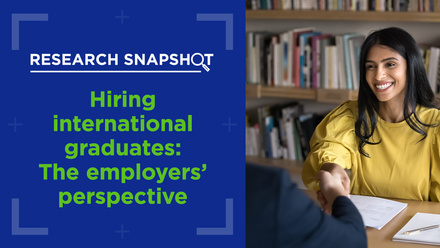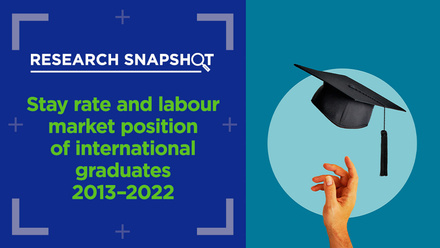International graduate employability: whose job is it anyway?

Traditionally, the responsibility of a higher education institution (HEI) towards its students ends at graduation. Having received their tuition, our graduates are waved goodbye with a degree certificate and our congratulations. However, what our graduates do next still impacts us in several ways, and thus the question becomes whether our responsibility towards them ever truly ends. Perhaps we should expand our efforts to equip students for their future careers? Especially with regards to international graduates. This makes for a much more sustainable approach.
Post-graduate employment is key in international student recruitment
Post-graduate employment and career development possibilities have long been cited as the most important reasons for international student mobility. Most HEIs in the Global North are strategically recruiting international students and financial reasons usually outweigh the pedagogical or cultural ones for doing so. We are very familiar with the expectations of these students, especially the tuition fee-paying students (who in Europe are generally those from non-EU/EEA countries), to find a job after graduation – and they increasingly expect to receive our support in doing so.
Most HEIs do provide career support, networking events and academic guidance to their students, but far fewer offer these services to their post-graduates. Why is this?
Lack of data
Another question is whether any employment of our international graduates is good enough for us, or is employment corresponding to the completed degree what we are aiming for? Many countries have some sort of data collection method for the employment outcomes of their graduates, and some of it is even tied to funding. But most of it is purely quantitative data stating how many graduates are employed.
Most HEIs do provide career support to their students, but far fewer offer these services to their post-graduates
We know relatively little about the international graduates who have left their host country, nor do we know a great deal about the quality of that employment. The issue of this lack of data has also been raised in the European Commission’s European Graduate Tracking Initiative (EGTI), aiming to develop and implement "regular, comprehensive, comparable and longitudinal European data collection on higher education graduates" through the EUROGRADUATE project. The project will develop a mechanism for monitoring graduates’ educational pathways, study experiences, and how these affect their post-graduation careers.
Increased collaboration between alumni relations and career services
Graduate outcomes continue to be a visible topic globally, and especially in the large Anglophone countries with a marketisation approach to international student recruitment. As the number of HEIs in Europe charging tuition fees for non-EU/EEA students increases, many are now looking for innovative ways to integrate international alumni relations with career preparation and company services.
Most HEIs also offer some form of alumni relations activities, but keeping in touch with international alumni is notoriously hard. Alumni relations and career services have begun to work more collaboratively, especially in business schools with a clear focus on employment outcomes and active alumni engagement. Yet, these collaborations tend to revolve around enabling the alumni to support the careers of current students, not around providing career support for the alumni themselves. International alumni hold a critical stock of knowledge and social capital, very often lying dormant. HEIs stand to benefit from tapping into their professional networks, experience and job offerings as employers themselves. How do we repay this service?
Consider inviting your alumni to help you support their international peers as:
- mentors to instil inspiration and act as role models through peer mentoring with more recent international alumni
- sources of career advice, encouragement and referrals for navigating the host (or home) country labour market
- providers of career development training as experts in topics such as inclusive leadership, change management, salary negotiation and career advancement
A lifelong partnership with alumni
International graduate employment outcomes should be a shared goal across the HEI and open up for many previously unexplored collaborations within, and outside, the organisation. Exciting new technology tools for alumni engagement help us mobilise international alumni across time, space and function, radically expanding the roles that they can play in their relationship with their alma mater.
Is any employment of our international graduates good enough, or is employment corresponding to the completed degree what we are aiming for?
However, it is critical to view the concept of alumni as an experience; these individuals were once our prized students and see themselves as being engaged in a lifelong journey alongside the institution. They are not an instrument, but rather equals, in a mutually beneficial relationship. This increases the chances of ensuring that international graduates remain connected to the institution even after they have left its physical campus.
This proactive approach not only enhances the continuous employability of our alumni but also strengthens the institution's reputation as a forward-thinking educational hub. Offering continued support through alumni networks, professional development opportunities, and access to resources, fosters a culture of lifelong learning. This commitment to ongoing support reinforces the idea that the relationship between the institution and its graduates is not a transaction but a lifelong partnership that stretches far beyond graduation.






